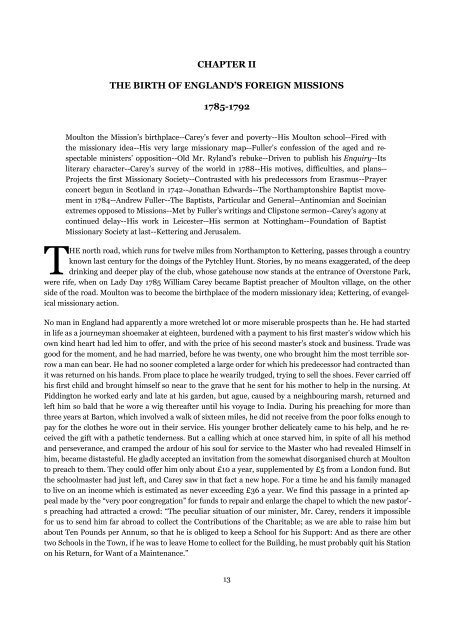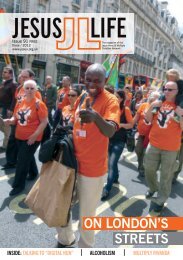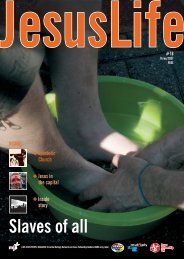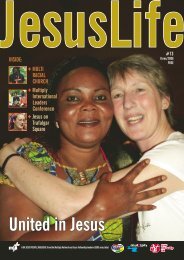Life of William Carey by George Smith - The Jesus Army
Life of William Carey by George Smith - The Jesus Army
Life of William Carey by George Smith - The Jesus Army
You also want an ePaper? Increase the reach of your titles
YUMPU automatically turns print PDFs into web optimized ePapers that Google loves.
CHAPTER II<br />
THE BIRTH OF ENGLAND’S FOREIGN MISSIONS<br />
1785-1792<br />
Moulton the Mission’s birthplace--<strong>Carey</strong>’s fever and poverty--His Moulton school--Fired with<br />
the missionary idea--His very large missionary map--Fuller’s confession <strong>of</strong> the aged and respectable<br />
ministers’ opposition--Old Mr. Ryland’s rebuke--Driven to publish his Enquiry--Its<br />
literary character--<strong>Carey</strong>’s survey <strong>of</strong> the world in 1788--His motives, difficulties, and plans--<br />
Projects the first Missionary Society--Contrasted with his predecessors from Erasmus--Prayer<br />
concert begun in Scotland in 1742--Jonathan Edwards--<strong>The</strong> Northamptonshire Baptist movement<br />
in 1784--Andrew Fuller--<strong>The</strong> Baptists, Particular and General--Antinomian and Socinian<br />
extremes opposed to Missions--Met <strong>by</strong> Fuller’s writings and Clipstone sermon--<strong>Carey</strong>’s agony at<br />
continued delay--His work in Leicester--His sermon at Nottingham--Foundation <strong>of</strong> Baptist<br />
Missionary Society at last--Kettering and Jerusalem.<br />
THE north road, which runs for twelve miles from Northampton to Kettering, passes through a country<br />
known last century for the doings <strong>of</strong> the Pytchley Hunt. Stories, <strong>by</strong> no means exaggerated, <strong>of</strong> the deep<br />
drinking and deeper play <strong>of</strong> the club, whose gatehouse now stands at the entrance <strong>of</strong> Overstone Park,<br />
were rife, when on Lady Day 1785 <strong>William</strong> <strong>Carey</strong> became Baptist preacher <strong>of</strong> Moulton village, on the other<br />
side <strong>of</strong> the road. Moulton was to become the birthplace <strong>of</strong> the modern missionary idea; Kettering, <strong>of</strong> evangelical<br />
missionary action.<br />
No man in England had apparently a more wretched lot or more miserable prospects than he. He had started<br />
in life as a journeyman shoemaker at eighteen, burdened with a payment to his first master’s widow which his<br />
own kind heart had led him to <strong>of</strong>fer, and with the price <strong>of</strong> his second master’s stock and business. Trade was<br />
good for the moment, and he had married, before he was twenty, one who brought him the most terrible sorrow<br />
a man can bear. He had no sooner completed a large order for which his predecessor had contracted than<br />
it was returned on his hands. From place to place he wearily trudged, trying to sell the shoes. Fever carried <strong>of</strong>f<br />
his first child and brought himself so near to the grave that he sent for his mother to help in the nursing. At<br />
Piddington he worked early and late at his garden, but ague, caused <strong>by</strong> a neighbouring marsh, returned and<br />
left him so bald that he wore a wig thereafter until his voyage to India. During his preaching for more than<br />
three years at Barton, which involved a walk <strong>of</strong> sixteen miles, he did not receive from the poor folks enough to<br />
pay for the clothes he wore out in their service. His younger brother delicately came to his help, and he received<br />
the gift with a pathetic tenderness. But a calling which at once starved him, in spite <strong>of</strong> all his method<br />
and perseverance, and cramped the ardour <strong>of</strong> his soul for service to the Master who had revealed Himself in<br />
him, became distasteful. He gladly accepted an invitation from the somewhat disorganised church at Moulton<br />
to preach to them. <strong>The</strong>y could <strong>of</strong>fer him only about £10 a year, supplemented <strong>by</strong> £5 from a London fund. But<br />
the schoolmaster had just left, and <strong>Carey</strong> saw in that fact a new hope. For a time he and his family managed<br />
to live on an income which is estimated as never exceeding £36 a year. We find this passage in a printed appeal<br />
made <strong>by</strong> the “very poor congregation” for funds to repair and enlarge the chapel to which the new pastor'-<br />
s preaching had attracted a crowd: “<strong>The</strong> peculiar situation <strong>of</strong> our minister, Mr. <strong>Carey</strong>, renders it impossible<br />
for us to send him far abroad to collect the Contributions <strong>of</strong> the Charitable; as we are able to raise him but<br />
about Ten Pounds per Annum, so that he is obliged to keep a School for his Support: And as there are other<br />
two Schools in the Town, if he was to leave Home to collect for the Building, he must probably quit his Station<br />
on his Return, for Want <strong>of</strong> a Maintenance.”<br />
13
















